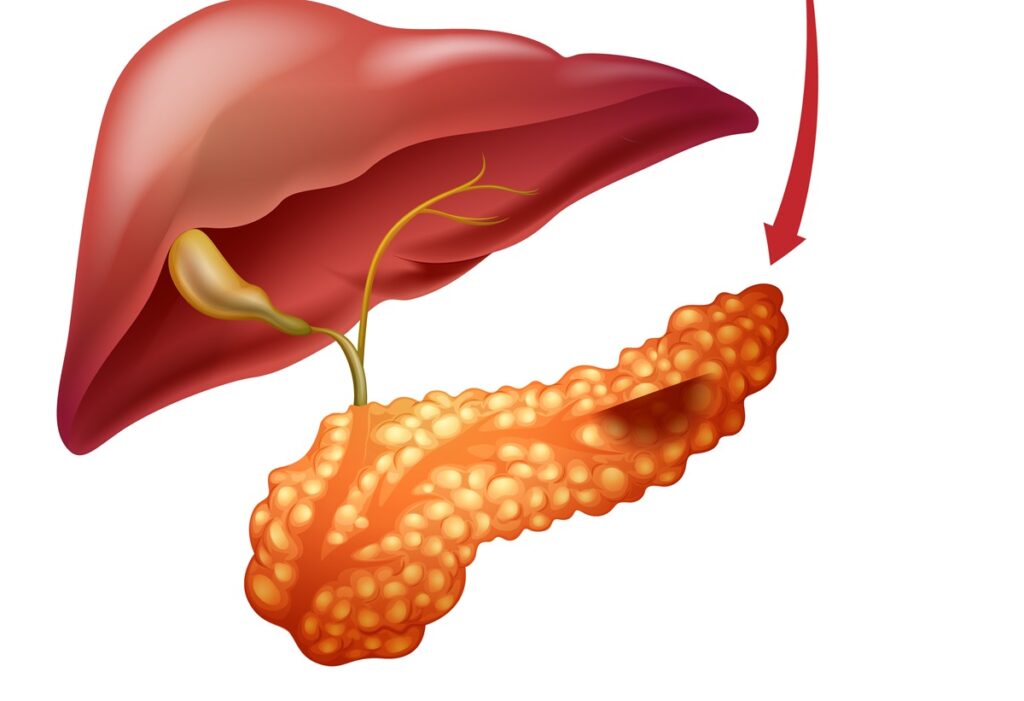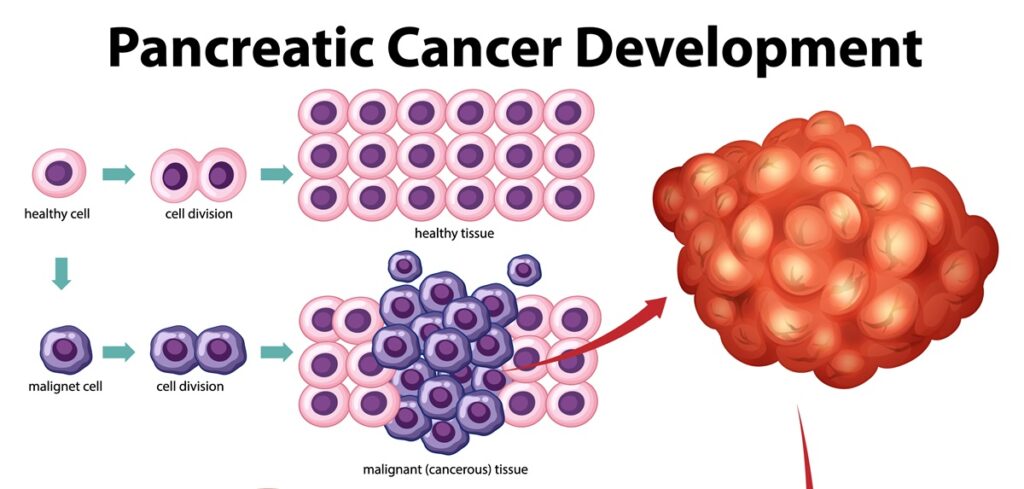

Pancreatic cancer stands among the most lethal forms of cancer due to its often late-stage diagnosis. Recognizing early signs becomes crucial for timely intervention and effective treatment. In this article, we’ll delve into seven early indicators of pancreatic cancer to enhance awareness and prompt action for better health outcomes.
Table of Contents
7 Early Signs of Pancreatic Cancer :
Unexplained Weight Loss:
- Significant weight loss without intentional changes in diet or exercise could be an early sign.
- Pancreatic tumors may disrupt the digestive system, leading to unintended weight loss.
- Testimonial: “Rapid, unexplained weight loss was a clear sign that something was seriously wrong.” – John Doe, pancreatic cancer survivor.
Jaundice:
- Yellowing of the skin and eyes (jaundice) can indicate blocked bile ducts caused by pancreatic tumors.
- Symptoms include dark-colored urine and pale stools.
- Testimonial: “Persistent yellowing of my eyes turned out to be an early indicator of pancreatic cancer.” – Jane Smith, pancreatic cancer survivor.
Abdominal Pain:
- Persistent or recurring abdominal pain, often dull or achy and radiating to the back, may signal pancreatic cancer.
- While abdominal pain has various causes, when coupled with other symptoms, it warrants attention.
- Testimonial: “Constant nagging pain in my abdomen turned out to be a warning sign of pancreatic cancer.” – Mark Johnson, pancreatic cancer survivor.
Digestive Issues:
- Pancreatic cancer can lead to digestive problems, including diarrhea, oily stools, and changes in bowel habits.
- Digestive enzyme disruption affects fat digestion.
New-Onset Diabetes:
- Sudden-onset diabetes in individuals over 50 can be a warning sign.
- Pancreatic tumors may impact insulin production, causing changes in blood sugar levels.
Loss of Appetite:
- A sudden decrease in appetite may accompany pancreatic cancer as the tumor affects the digestive system.
- Individuals may experience a notable reduction in food intake.
Fatigue and Weakness:
- While fatigue and weakness are nonspecific symptoms, when combined with other signs, they raise concerns.
- Changes in metabolism and nutrient absorption due to the tumor may contribute to fatigue.
- Testimonial: “Prolonged fatigue and weakness were signals that something more serious was happening within my body.” – Sarah Thompson, pancreatic cancer survivor.
Treatment For Pancreatic Cancer
Treatment For Pancreatic Cancer Depends On The Stage And Severity Of The Cancer. Here Are Some Common Treatment Options.
Surgery:
Consists Of Removing The Tumor From The Pancreas. The Type Of Surgery Depends On The Location Of The Tumor. Some Common Procedures Include:
- Tumor Excision: Surgery To Remove A Tumor In The Head Of The Pancreas.
- Distal Pancreatectomy: Surgery To Remove The Tumor From The Left Side (Body And Tail) Of The Pancreas.
- Total Pancreatectomy: Surgery To Remove The Entire Pancreas. You Will Be Given Insulin For Life After This Surgery.
Chemotherapy:
- Medications, Either Taken Orally Or By Injection, Kill Cancer Cells.
- In Advanced Stages, It Only Helps Control The Growth Of Cancer Cells.
- Common Medications Include 5-Fluorouracil, Capecitabine, Irinotecan, And Oxaliplatin.
Radiotherapy:
- High-Energy Rays Are Used To Kill Cancer Cells.
Immunotherapy:
- This Is A Type Of Biological Therapy That Uses Substances To Stimulate Or Suppress The Immune System To Help The Body Fight Cancer.
Early detection significantly influences the outcome of pancreatic cancer. If any of these symptoms are experienced, seeking prompt medical attention is crucial. Proactivity, attentiveness to one’s body, and timely consultation with healthcare professionals can contribute to improved health and well-being. As highlighted by a survivor: “Early detection saved my life. Be vigilant and take action.” – Michael Brown, pancreatic cancer survivor.
FAQs:
- Does stage 1 pancreatic cancer have symptoms?
- Stage 1 pancreatic cancer often causes no symptoms. As the cancer grows and spreads, pain often develops in the upper abdomen and sometimes spreads to the back.
- Other symptoms may include jaundice, nausea, loss of appetite, weight loss, fatigue, weakness, and depression.
- What can be confused with pancreatic cancer?
- Pancreatic cancer is sometimes misdiagnosed as conditions including gallbladder disease, gastroesophageal reflux disease (heartburn and reflux), peptic ulcer (painful area in the stomach, esophagus, or small intestine), and irritable bowel syndrome. (SII).
- Can you survive pancreatic cancer?
- Yes, survival is possible, especially if the cancer is diagnosed at an early stage.
- However, the survival rate varies greatly depending on the stage of the cancer at the time of diagnosis.
- The 5-year survival rate if pancreatic cancer is localized is 42%. If there are metastases, the rate is 3%. Overall, the 5-year survival rate is 11%.
- What is the number one symptom of pancreatic cancer?
- The most common symptom of pancreatic cancer is abdominal pain, which can radiate to the back.
- Other symptoms include loss of appetite, weight loss, jaundice (yellowing skin and eyes), light-colored or greasy stools, dark or brown urine, and itching.
- Can pancreatic cancer be cured?
- Pancreatic cancer has the potential to be cured if caught very early. Up to 10 percent of patients who receive an early diagnosis remain free of the disease after treatment.
- However, in most cases where it is diagnosed late, the prognosis is poor and it is almost impossible to cure completely.
- How long can you live with pancreatic cancer?
- The life expectancy of patients with pancreatic cancer varies depending on the stage of the cancer at the time of diagnosis.
- The 5-year relative survival rate for localized pancreatic cancer is 42%, for regional pancreatic cancer it is 15%, and for distant pancreatic cancer it is 3%.
- Who is the person who lives the longest with pancreatic cancer?
- I’m sorry, but I don’t have specific information on individual pancreatic cancer survival records.
- What is the most successful treatment for pancreatic cancer?
- The most successful treatment depends on the stage and location of the tumor, as well as the patient’s overall health.
- Treatment options include surgery, chemotherapy and radiation therapy. For patients whose pancreatic cancer has already spread to other organs at the time of diagnosis, chemotherapy is the primary treatment.
- Patients whose cancer is limited to the pancreas may also be candidates for radiation and surgery.


